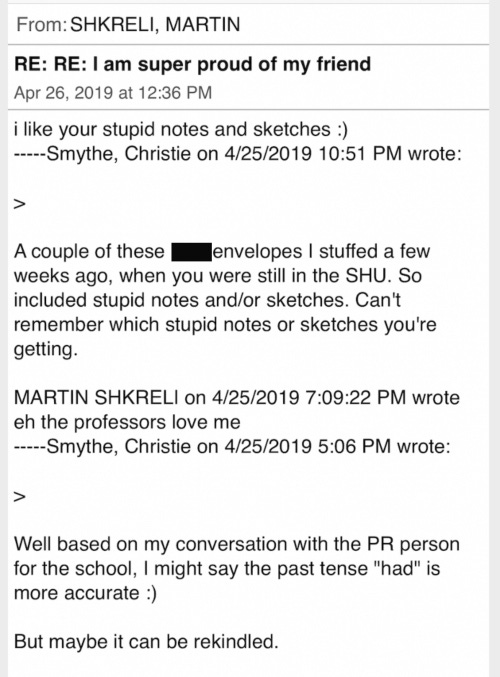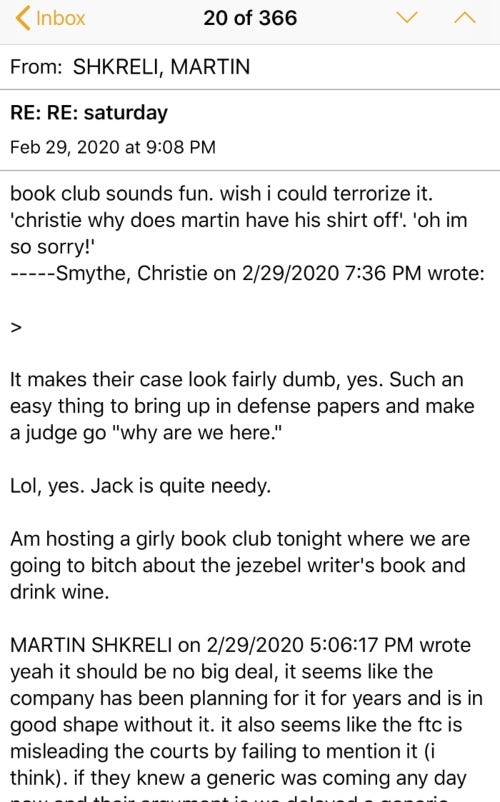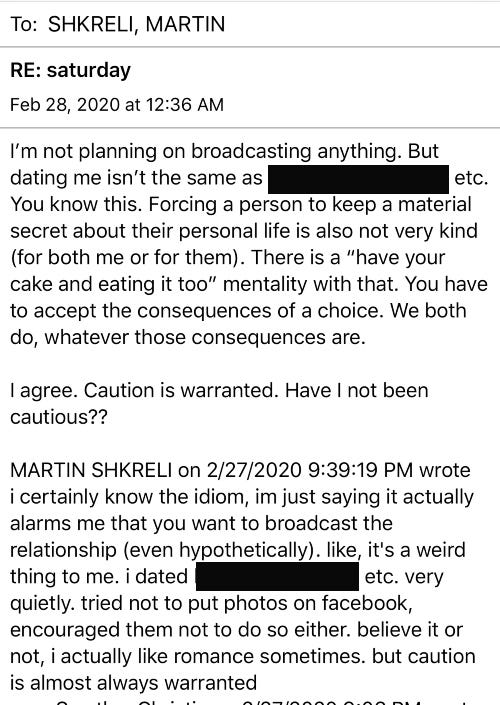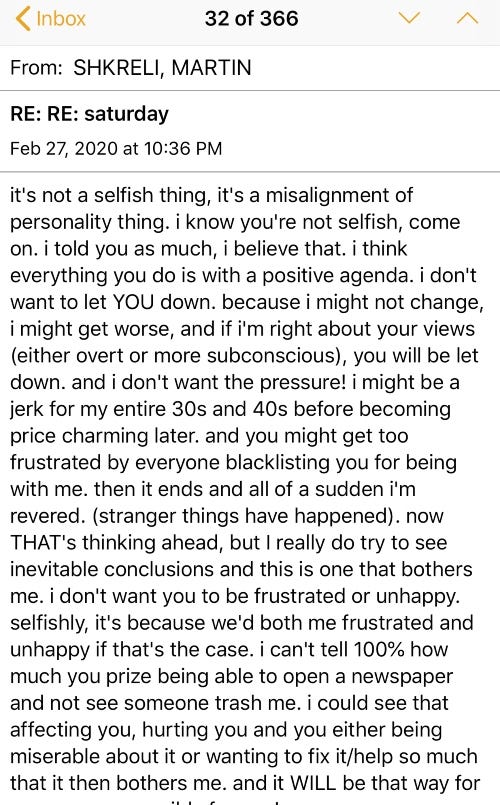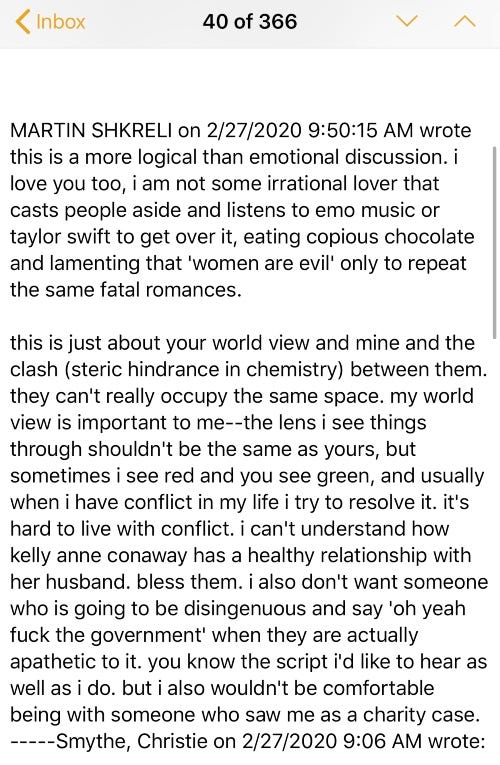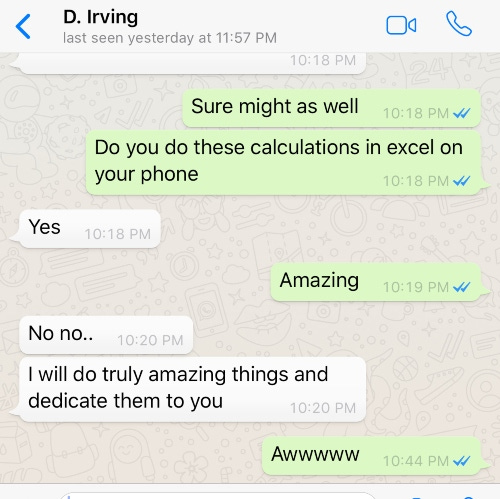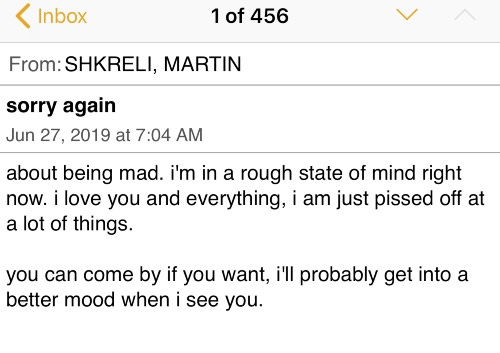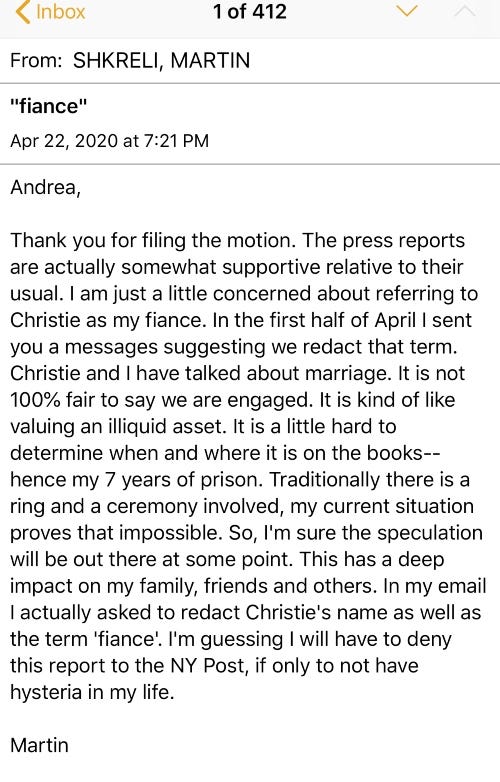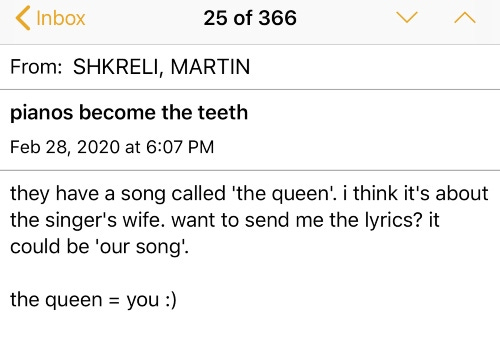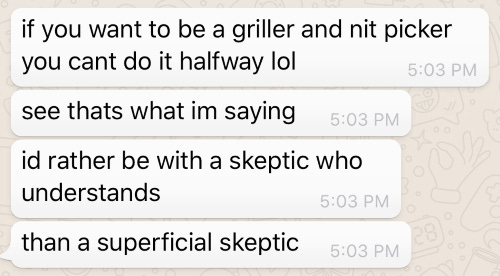Chapter 14, Part 1: What I miss...and don't
A selection of messages I received from Martin Shkreli while he was in prison which particularly triggered nostagia, fondness, sadness, or frustration. (No regret, though.)
Going through the hundreds of emails, WhatsApp messages, and letters I’ve saved from my years of being “involved” with Martin Shkreli is an emotionally exhausting undertaking. I’m not sure which is worse: looking at the messages where he pledged unwavering affection for me (which he flaked on) or the moments where he abruptly turned cold and pushed me away because he was angry, depressed, annoyed, or fearful. There are way too many of both.

The highs during our relationship were otherworldly; I had so much oxytocin flowing through me that I felt invincible. When Martin was transferred to Pennsylvania from New Jersey in 2019 over his contraband phone controversy, I took driving lessons and got a New York license, overcoming a phobia that had kept me from getting behind the wheel for more than a decade, so I could visit him more easily.
Traffic there and back through New Jersey was just as nightmarish as advertised, but not once did my adrenaline surge to panic levels. That was a pleasant surprise — years earlier when I lived in Arizona and was dependent on a car, I often had to pull over and take deep breaths to get my anxiety under control.
In 2020, when I went public about our romance, I could also easily tune out critics judging me solely for loving him. Love was love, and it was able to triumph over all the pettiness and prejudices in humanity, or at least so my happy chemical-soaked brain assumed. “F*ck the haters” was my operating disposition.
But the lows were paralyzing. Worse, like potholes on a dark road, they were incredibly difficult to avoid. Prison made communication hard. Without being able to see or talk to Martin regularly, allowing me to pick up on subtleties and non-verbal cues, I had no hope of being able to anticipate his sudden mood swings.
The situation became virtually impossible when the pandemic set in and visitation was shut down. I could never be sure where I stood with him from one day to the next. Sometimes he would refuse to speak with me and other times he would resume calling me his “girlfriend” and being sweet and apologetic.
Painful or not, I’ve had to endure the rollercoaster all over again over the past year, at least temporarily, so I can tell a full and cogent story. I’ve had to spend hours wading through messages which are saved in massive, disorganized digital and physical piles, trying to isolate the most relevant and interesting sections. Inevitably, I came across many that didn’t really “fit” whatever theme I was trying to flesh out but triggered powerful waves of nostalgia, fondness, frustration, or sadness.
I felt like the most thought-provoking and poignant ones belonged somewhere in this book, even if just compiled in a semi-random hodgepodge. “Show don’t tell,” every great writing instructor I had told me. If my “telling” in SMIRK so far failed to fully convey how I managed to love Martin Shkreli — a turbulent manchild on his best days and a walking disaster on his worst — maybe some “showing” will help to fill in the gaps.
#1: “Notes and sketches”
The context for this conversation was me telling him about a ground-breaking multiple sclerosis-related study co-published by one of my childhood friends, a scientist who was the lead author. At the time, she was at a research institution he was especially familiar with, having worked with a professor there on a PKAN treatment while he was CEO of Retrophin.
During Martin’s multiple stints in solitary confinement, I sent him untold amounts of mail because I knew that was his only link with the outside world. At times, I got creative, sending him printed life-sized pictures of chess pieces, a chess board, and playing cards so that he could tear them out and use them. I also sent him doodles, printed-out memes, and silly notes.
Martin had just gotten out of solitary (the “SHU”) and was forwarded a lot of mail that hadn’t quite made it to him during his stay.
#2. Terrorizing book club
We were discussing the Federal Trade Commission’s antitrust case against Martin over allegedly directing his company (while in prison) to block generic competition for Daraprim, the drug whose price he infamously raised 5,000%. Viewing the case through a prism of way too much optimism, Martin told me…
…it should be “no big deal.”
I replied that the fact that a generic version of Daraprim was just a few weeks away from FDA approval when the case was filed made allegations of thwarted competition “look fairly dumb.” (The agency won, however, and got everything it asked for, including a $65 million judgment against Martin and an order banning him for life from the pharmaceutical industry.)
I mentioned I was having a book club meeting that evening, and he said (jokingly) that it would be fun to “terrorize” it.
#3. “Broadcast the relationship”
One of the biggest struggles I had dating Martin wasn’t with him directly; it was feeling like I had to lie about my personal life.
Understanding the nature of gossip, I realized I couldn’t expect our relationship to remain out of the news if I spoke openly with friends and acquaintances about it. I knew too many people in the media, and the story was just too good not to eventually spread beyond my circle of trust, to the ears of a journalist who would pounce on it.
I wanted to be able to speak frankly and truthfully, and to do that I had to come forward, be proactive, and own the narrative, I reasoned. The whole idea of going public made Martin queasy, though. He neither absorbed my (fairly sound) logic nor appreciated my feelings on the subject.
#4. “You will be let down”
Earlier, in the same email chain, Martin sent me an impassioned diatribe. It essentially boiled down to this: He was worried I was trying to “fix” him (ok, not an unreasonable suspicion) and he wasn’t sure he could be “fixed.”
He didn’t want the pressure of my expectations. He also dwelled on my concern about his “image” as the one-time “most hated man in America” and whether I might eventually resent him because there was seemingly nothing that could be done to improve it.
“I don’t want to let YOU down. Because I might not change,” he wrote. “I might get worse, and if I’m right about your views (either overt or more subconscious), you will be let down. And I don’t want the pressure!”
He added, stingingly: “I can’t tell 100% how much you prize being able to open a newspaper and not seeing someone trash me.”
#5. “A charity case”
The same conversation, which I suppose in hindsight was a precursor to a breakup, included Martin insisting that our worldviews would always be in conflict, and he did not want to be constantly in conflict or to be with someone who saw him as a “charity case.”
“This is a more logical than emotional discussion,” he told me. “I love you too. I am not some irrational lover that casts people aside and listens to emo music or Taylor Swift to get over it, eating copious chocolate and lamenting that ‘women are evil’ only to repeat the same fatal romances.” (I had made no such accusation, but I assumed he was exactly the sort of “irrational lover” he described in detail which he claimed he was not.)
#6. “Dedicate them to you”
An interesting aspect of Martin’s concern that he would fail to live up to my expectations is that I hadn’t foisted any on him. He did that to himself.
While at FCI Fort Dix in New Jersey, using his contraband cellphone (on WhatsApp he employed the pseudonym “Dan Irving”), he would regularly make dramatic claims about what he hoped to accomplish when he got out of prison and how he would repay my affection.
“I will do truly amazing things and dedicate them to you,” he told me.
#7. “Rough state of mind”
While it was common for Martin to get annoyed or angry and shut down and refuse to communicate for a while, he also usually apologized, very thoughtfully. I got a fair number of apologies like this.
#8. “Hysteria in my life”
After Martin filed a motion seeking compassionate release (which was denied), in which he asked to live with me, his “fiancée,” the New York Post published a story about the filing declaring that the “Pharma Bro” was “engaged” to a mystery New York woman.
Martin was horrified by the speculation about his love life, especially because people thought he was actually engaged. He cc’d me on an email to his lawyers, politely expressing annoyance that the term “fiancée” wasn’t redacted from the court papers. My name and identifying information had been redacted.
Considering that being engaged, or at least perceived as being engaged, was likely helpful to his cause (that was why his lawyers used the term “fiancée”), I was surprised he was so bothered.
#9. “The Queen”
At the same time he was struggling with the idea of our relationship, Martin continued to profess adoration for me. He sent me this email after the last time I visited him in person while he was in prison before Covid struck. For more than a year, he had occasionally thrown out unprompted suggestions for what “our” song might be.
#10. “A superficial skeptic”
Martin could not seem to decide whether he wanted a woman in his life who would be a cheerleader or a woman who would be his loyal opposition. Sometimes he would accuse me of being too critical. Other times, perplexingly, such as in this WhatsApp message, he would claim I wasn’t being critical enough.
There was no “Goldilocks” region I could occupy with him when it came to constructive feedback. I felt set up for failure no matter what approach I took. His fatalism ultimately proved more damaging to our relationship than any amount or type of media exposure, I think. There was no arguing with it. It was something I definitely couldn’t “fix.”

